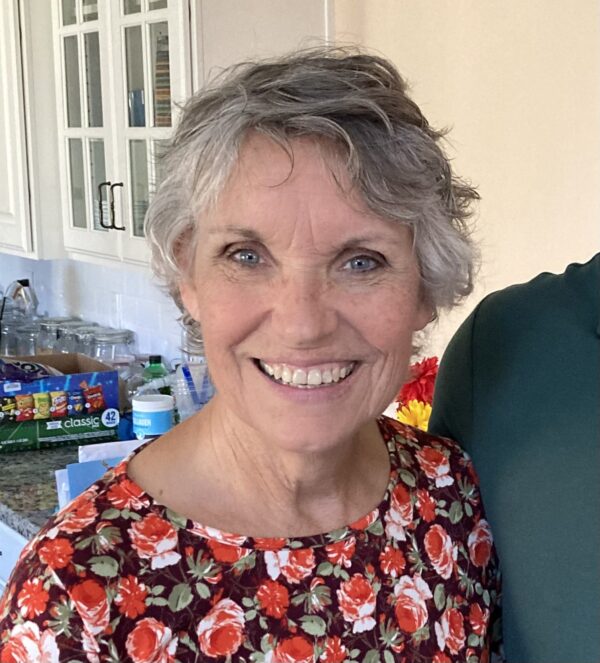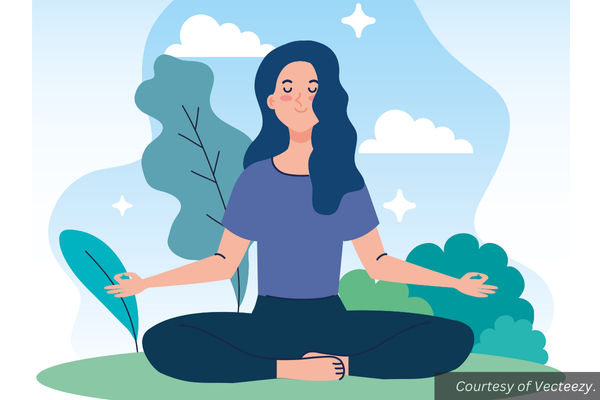“Meditation” is part of a monthly column of mental health articles by Karen Munson. Read the previous month’s article, “Important Words,” at the link.
Meditation goes back thousands of years and has dramatically increased in use in recent years. I first began meditating while I had COVID. I immediately found it comforting, so I started meditating every morning with a Mindfulness app on my phone. One day, after doing it for a week or more, the app didn’t work, and my anxiety soared! Only then did I realize the extent of the calming effect it had had on me.
As soon as I accessed the app again, I purchased a lifetime membership, unwilling not to have it available for what had become my morning routine. Every morning, as I awaken, I eagerly anticipate the lesson I will learn about myself. It has become a cherished habit.
There are many resources for meditation for releasing trauma and distress, either with a live practitioner or through an app on your phone or an online site. The soothing voice of the practitioner will guide you through a gentle healing session that supports you in a safe place as you release anxiety and stress from your body through your breathwork.
Trauma and stress don’t only cause psychological injury but also change the physiological structure of our brains. The same malleability that alters our brains in response to trauma also makes recovery possible. Meditation helps us heal from trauma by offering us a new perspective on past and current events and, ultimately, by changing the structure of our brain.
Through meditation, we distance ourselves from stressful events, creating a space between the experience and our emotions. With practice, we can address our trauma responses with curiosity and compassion, recognizing that we are not our trauma, nor are we the accompanying emotions. That is immensely liberating.
Meditation is the synchronization of body and mind in the present moment for health and well-being. Your practitioner will ask you to be physically “present,” aware of the sensations you can feel and touch, the fabric on your skin, the temperature, and perhaps a soft breeze.
Your practitioner will also ask you to be present mentally, only here at this moment in time, not ruminating about past events or anxious about future ones. It is like recess for the mind, giving it a break from all the busyness, chaos, and clutter. Bask in the moment.
One practitioner suggests that the mind is like a lake. If you want to see the bottom, you need the water to be still, not constantly stirred up. Be the witness, but don’t be the judge. Don’t turn your head away; you are the witness of your experiences in a safe, calm space, observing and accepting.
The amygdala, the fight-or-flight part of your brain, produces feelings of anxiety, fear, and general stress. Trauma increases activity in the amygdala, but meditation slows it down. The hippocampus regulates cognitive ability, memory, self-awareness, and empathy. Trauma impairs the hippocampus, but meditation strengthens it.
According to Mindworks founder Bart Mendel, “When you train your brain to be alert and relaxed during meditation, you not only heighten your emotional intelligence, you also strengthen your mind. And a strong, resilient mind naturally enhances physical well-being.”
And that is what meditation does. It gives us a healthy reprieve that not only soothes the soul for that moment but transforms the brain to overcome past events, and strengthens it for the future.
From another perspective on the value of meditation is this passage by author Bob Shackles. “Don’t meditate to fix yourself, to heal yourself, improve yourself, or to redeem yourself. Rather do it as an act of love, with deep, warm friendship to yourself. In this way there is no longer any need for the subtle aggression of self-improvement, the endless guilt of not doing enough. It offers a possibility of an end to the ceaseless rounds of trying so hard that wraps so many peoples’ lives in a knot. Instead, there is meditation as an act of love. How endlessly delightful and encouraging.”
Whichever approach resonates with you, healing or a warm reprieve from trying so hard, meditation offers relief and comfort.

Karen M. Munson – Escalante
Karen is an associate editor at The Byway. She is fascinated and fulfilled by all things involved with writing. After graduating from BYU, she taught English at Escalante High School for three years. She pursues opportunities to write and support others in their writing. Karen has published three books with four more scheduled to be released in 2024. She and Reed are the parents of ten children and the grandparents of 35 grandchildren.
Karen is the author of the New Twist on Mental Health column in The Byway.

